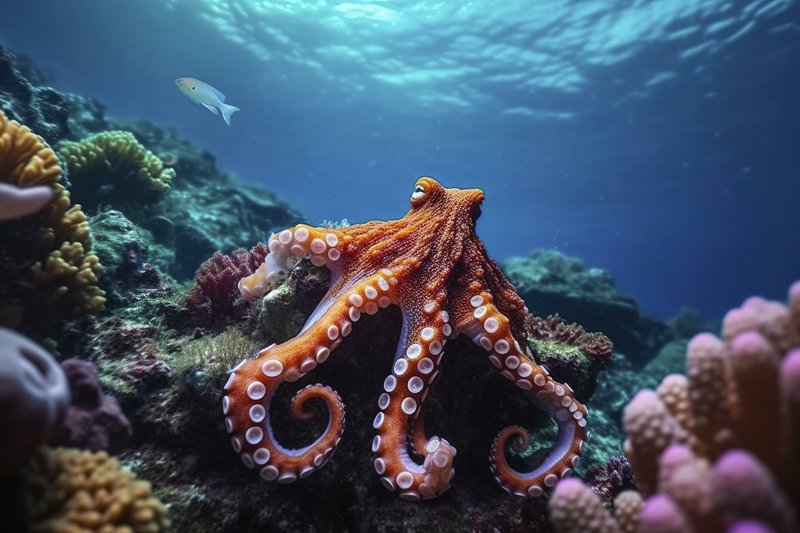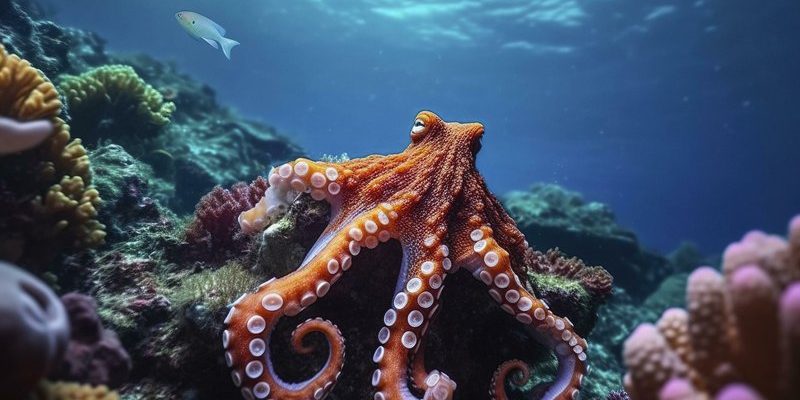
Imagine diving into the ocean and suddenly spotting an octopus nestled between colorful corals. That’s just one of the many places these clever cephalopods can be found. They inhabit a range of environments, from tropical reefs to deep-sea trenches. So, whether you’re a marine enthusiast or just curious about marine life, let’s explore the diverse homes of the octopus.
The Ocean: A Vast Playground for Octopuses
Most octopuses are found in the ocean, where they thrive in a variety of marine habitats. The majority of species prefer warm, shallow waters, particularly in tropical and subtropical regions. Think of famous spots like the Great Barrier Reef or the Caribbean Sea, where coral reefs provide shelter and plenty of food. Octopuses are often seen lurking in crevices or hiding under rocks, blending into their surroundings thanks to their incredible ability to change color and texture.
As we dive deeper into the ocean, the habitat changes. Some octopus species have adapted to life in the depths of the sea, often at remarkable depths of over 200 meters. These creatures, like the deep-sea octopus, spend their time in the dark, cold waters, using bioluminescence to attract prey. It’s a whole different world down there, full of strange lights and eerie sounds that make it feel like a scene from a sci-fi movie.
Interestingly, octopuses aren’t just passive creatures waiting for food to come to them. They’re active hunters, using their intelligence to outsmart prey. Depending on the species, they can be found in bustling underwater cities teaming with fish or in the serene stillness of the open ocean. Their ability to adapt helps them survive in various oceanic environments.
Coastal Areas and Intertidal Zones
Have you ever walked along the beach and spotted small tide pools? These coastal areas are another fantastic habitat for octopuses. During low tide, these pools become small ecosystems, packed with snails, crabs, and other creatures that octopuses love to eat. Octopuses can be quite clever, finding ways to get into these pools to hunt, and they’re known to hide in the rocky crevices until the perfect moment to strike.
The intertidal zone, which is the area between high and low tide, is a popular spot for some octopus species. They often seek shelter in rocks and crevices to avoid predators and the harsh sun. The transition between land and sea creates a unique environment where octopuses can thrive. You might be wondering about the challenges they face—changes in water temperature and salinity can make it tough for these creatures, but they’ve adapted well over time.
One notable example is the common octopus, which often resides in this area and is recognized for its intelligence and problem-solving skills. These octopuses can learn to open jars to get to food, showcasing their brainpower. It’s fascinating to see how the environment shapes their behavior and abilities.
Octopuses in Coral Reefs
Coral reefs are often called the rainforests of the ocean, and for good reason. They’re teeming with life, diversity, and color. Octopuses thrive in these vibrant ecosystems, where they can easily camouflage themselves among the corals and vibrant marine flora. The coral provides not just cover but also a wealth of food options, from small fish to crustaceans.
Among the corals, octopuses are expert hunters. They can squeeze themselves through tiny openings, making them very resourceful in finding food. Some species of octopus even build shelters using coral pieces, shells, and debris, creating a safe space to retreat when danger approaches. This adaptability is part of what makes octopuses so fascinating.
Coral reefs are also crucial for the overall health of our oceans. They support many marine species and help maintain ecological balance. Unfortunately, they’re under threat due to climate change and pollution, which also affects octopus populations. Protecting these environments is vital for octopuses and countless other creatures.
Octopuses in the Deep Sea
As we venture even deeper into the ocean, we enter a realm where few people go—an environment that challenges even the hardiest of creatures. Deep-sea octopuses like the Dumbo octopus have adapted to life in extreme conditions, where sunlight rarely penetrates, and pressure is intense. These octopuses possess unique traits, like a soft body that allows them to navigate the dark depths gracefully.
In the deep sea, resources are scarce, and food is often hard to come by. Some deep-sea octopuses have developed strategies to survive in this harsh environment. They often rely on scavenging, feeding on the remains of fish and other sea creatures that sink from the surface. This makes their way of life quite different compared to their shallow-water cousins.
While we know a good amount about shallow-water octopuses, deep-sea species remain largely a mystery. Researchers are continuously uncovering new information about these elusive animals. Every dive into the deep sea can reveal something new, reminding us of how much we still have to learn about our oceans.
Freshwater Octopuses: A Curious Exception
Now, here’s something you might not expect: some octopuses are found in freshwater! The most notable example is the African dwarf octopus, which can live in rivers and lakes. These freshwater octopuses are rare compared to their ocean-dwelling relatives. Imagine finding an octopus in a river instead of the ocean—it’s almost like finding a unicorn!
Freshwater habitats pose unique challenges for octopuses. They have to cope with different water conditions, like salinity and temperature, that aren’t typical for their saltwater cousins. This means their bodies have special adaptations to thrive in these environments, which can be both fascinating and quite complex.
While not as prominent as oceanic octopuses, these freshwater species remind us that life is incredibly diverse and adaptable. They show us that with the right conditions, octopuses can thrive in places we’d least expect.
Conservation: Protecting Octopus Habitats
Understanding where octopuses are found is more than just a curiosity; it’s essential for their conservation. Oceans, reefs, and even freshwater habitats face numerous threats from human activity. Overfishing, pollution, and climate change significantly impact octopus populations and their environments. Here’s the thing: protecting these ecosystems is crucial not just for the octopus but for the entire marine environment.
Joining local conservation efforts can make a difference. Whether it’s participating in beach clean-ups, supporting sustainable fishing practices, or advocating for marine protected areas, every action counts. It’s a team effort to ensure that future generations can enjoy the wonder of octopuses and their diverse habitats.
Awareness is the first step toward change. By educating ourselves and others about the importance of octopuses and their ecosystems, we can create a ripple effect that leads to action. After all, as fascinating as these creatures are, they are part of a larger story that includes all of us.
In exploring where octopuses are found, we’ve uncovered a myriad of habitats that these remarkable creatures call home. From the shallow, sunlit waters of coral reefs to the mysterious depths of the ocean, octopuses show incredible adaptability and intelligence. Whether they’re hiding in rocky crevices or gracefully gliding through the open sea, octopuses remind us of the beauty and complexity of marine life.
As we move forward, let’s embrace our role in safeguarding their habitats. Understanding their world helps us appreciate these extraordinary beings and encourages respect for the oceans that support them. Every little effort toward conservation adds up, ensuring that octopuses and their incredible homes endure for generations to come. So next time you think of octopuses, remember their wide-ranging habitats and the need to protect the mysteries of the deep blue sea.

